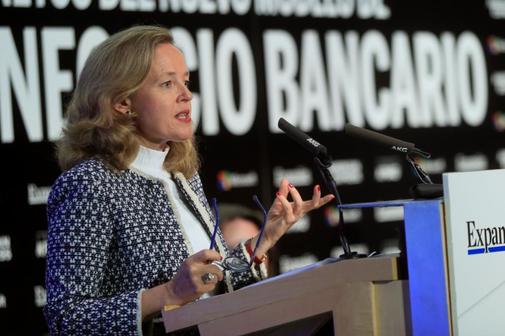Spain faces an end of the cycle in which the greatest growth rates after the crisis has passed. Except for a relaunch through serious reforms, the Spanish economy will no longer grow by 2% for several years. The last time it grew below that rate was in 2014, with 1.4% . In the next four years, he recorded an average growth of 3%, but that ends unfortunately.
This is clear from most of the cautious interventions at the X Financial Meeting organized yesterday by Expansión and whose maximum exponent was the vice president of the European Central Bank, Luis de Guindos. He was privately concerned about the depressive effect of bad news on the economy and wanted to make it clear that his institution does not see a high risk of recession in the Eurozone. But, at the time, he wanted to be realistic and predicted "reduced growth within a long period." and "with all the downside risks." Bad environment for a Spain in institutional paralysis and without the perspective of parliamentary majorities capable of returning the national economy to higher growth rates than the main countries of the Eurozone.
The governor of the Bank of Spain, Pablo Hernández de Cos, joined: "It is expected that the global GDP growth this year will be the lowest since the international financial crisis and the Spanish economy has not been oblivious to this deterioration in activity." And he recalled that he has lowered his forecast for Spain to 2% in 2019, 1.7% in 2020 and 1.6% in 2019.
This decrease makes the necessary dream of creating half a million annual jobs until 2020 a chimera. The BBVA Research Service lowered it yesterday to 375,000 annually, which is still notable compared to other countries, but insufficient for a country that maintains the highest unemployment rate in the OECD after South Africa and Greece eleven years after the crisis .
This is coupled with a potential problem and the financial system, vital for the blood circulation of the economy. "I have been told for years that if you can take a bank with zero rates and would have responded that I don't know, let another do it," explained Sabadell Bank CEO Jaume Guardiola. This, by the way, declined, as did the president of CaixaBank, Jordi Gual, commenting on the sentence of the process. Not surprisingly, the markets were yesterday, once again fortunately. immune to tension unleashed in Catalonia. The president of KPMG Spain, Hilario Albarracín, encouraged recalling that Spanish banks have done their homework more than others, but BBVA CEO Onur Genç and Santander, José Antonio Álvarez, joined the rest in stressing the difficult Surrounding environment. Hernández de Cos recalled that Spanish banks do not stand out precisely in Europe for their solvency ratio with the problem of not being able to raise capital in the markets in a foreseeable period.
De Guindos sees "inescapable" mergers. "He has been saying that they are inescapable for years," said the CEO of Banco Santander, who rightly recalled the inability of Brussels and Frankfurt to foster transnational integrations. Guardiola touched, however, to show the "for sale" sign.
With all this panorama, the acting Minister of Economy, Nadia Calviño, yields and will send to Brussels today a downward revision of official forecasts . Renounce the upward revision of which he spoke in July or grow to 2% in 2020 as he still maintained last month. There comes an end of the cycle that should not be accepted, but try to reverse.
According to the criteria of The Trust Project
Know more- Spain
- Greece
- Luis de Guindos
- Nadia Calviño
- GDP
- Europe
- Catalonia
- economy
- minimum salary
- Macroeconomy
Printing Employment: serious generational hole
Fresh money Montero bingo: breaches 9 of 9 objectives in the Stability Law since 2018
Middle-earth Country country

